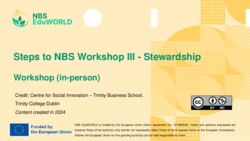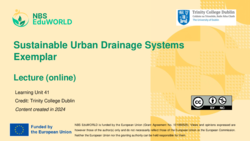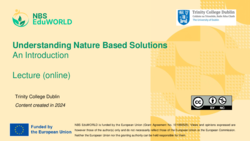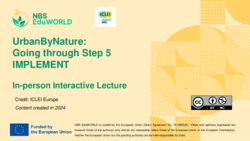
Learning Units
The NBS EduWORLD Learning Units page offers a comprehensive and flexible suite of resources designed to integrate Nature-Based Solutions (NBS) into higher education and professional training. With 50 curated Learning Units, this platform supports educators, students, and practitioners at all levels—undergraduate (UG), postgraduate (PG), doctoral (PhD), vocational, and entrepreneurial.
Covering a broad spectrum of themes and contexts, the Learning Units are structured around key educational streams:
- Common Core Units introduce foundational NBS concepts, such as ecosystem services, biodiversity, and the SDGs.
- 3rd Level Units target university-level learners, with a focus on implementation, policy, social inclusion, and future urban development.
- Entrepreneurial Units support learners exploring nature-based enterprises, business models, green finance, and sector-specific NBS opportunities.
- Vocational Units are tailored for practical skills development, project management, policy engagement, and multi-level governance.
- Case Studies and Workshops offer real-world applications and participatory methods from NBS EduWORLD demonstrator sites across Europe.
Each unit is aligned with European Qualification Framework (EQF) levels, ranging from Level 6 to Level 8, ensuring academic relevance and adaptability.
These Learning Units are editable and adaptable, supporting custom integration into curricula, practice-oriented, blending theory with applied learning, and geographically diverse, reflecting urban, rural, and coastal NBS contexts.
Download the full list of Learning Units
Whether you're a lecturer seeking ready-to-use teaching materials, a student exploring sustainability, or a professional upskilling in green innovation, the NBS EduWORLD Learning Units offer a unique, user-friendly gateway into nature-based thinking and action.
Search results ( 26 - 30 of 32 )
Steps to NBS Workshop II - Delivery with Co-Production
This is the second of three workshop sessions navigating workshop participants through the steps to the delivery of the coproduction of NBS in urban, rural or coastal context. This learning unit workshop focuses on delivery planning the goals drawing on the Connecting Nature Framework element: co-production. Participants are encouraged to consider a community context, that is, selecting an NBS in terms of location and scale, either from their professional or personal experience to work through workshop activities, including an assessment of the social, environmental and economic needs.
Find here the editable version and the teaching note.
Educational Level: Higher Education
Language: English
Organisation: TCD

Steps to NBS Workshop III - Stewardship
This is the third of three workshop sessions navigating participants through the steps to the stewardship of NBS in an urban context. Following the planning and delivery of an NBS intervention, this workshop focuses on stewardship (maintaining, monitoring and evaluation) navigating the Connecting Nature Framework. In this final iterative process of developing NBS, participants are encouraged to consider a community context, either from their professional or personal experience to apply to workshop activities.
Find here the editable version and the teaching note.
Educational Level: Higher Education
Language: English
Organisation: TCD

Sustainable Urban Drainage Systems Case
This unit covers the principles of Sustainable Urban Drainage Systems (SUDS), their importance in managing stormwater and promoting urban resilience to climate change. The session examines SUDS components like rain gardens, green roofs, and permeable pavements, and the role of EU policies and funding in supporting SUDS projects. Students will also explore case studies of cities successfully integrating SUDS for improved water management, biodiversity, and sustainability.
Find here the editable version and the teaching note.
Educational Level: Higher Education
Language: English
Organisation: TCD

Understanding Nature-Based Solutions: An Introduction
This unit explores the core concept of Nature-Based Solutions (NBS) and how they can be utilized to mitigate environmental challenges, such as flooding, heat islands, and loss of biodiversity. The presentation introduces students to key EU research projects and policy frameworks that shape NBS implementation in urban areas, including community engagement and policy development.
Find here the editable version and the teaching note.
Educational Level: Higher Education
Language: English
Organisation: TCD

UrbanByNature: Going through Step 5 IMPLEMENT
In this Learning Unit, you will enter the role of a stakeholder at the fictional Evergreen School. Located in a city with 200,000 residents, Evergreen is facing sustainability challenges after a city council report reveals its poor sustainability performance in areas such as emissions, energy inefficiency, and biodiversity decline. A student-led survey further highlights issues of food waste and a lack of green spaces to address these challenges. The school principal, Mx. Green, initiates a mission to transform Evergreen School into a model of sustainability.- you will collaborate and co-develop knowledge regarding key elements in the nature-based solutions implementation process.
Find here the editable version and the teaching note.
Educational Level: Higher Education
Language: English
Organisation: ICLEI


Funded by the European Union. Views and opinions expressed are however those of the author(s) only and do not necessarily reflect those of the European Union or the European Commission. Neither the European Union nor the granting authority can be held responsible for them.